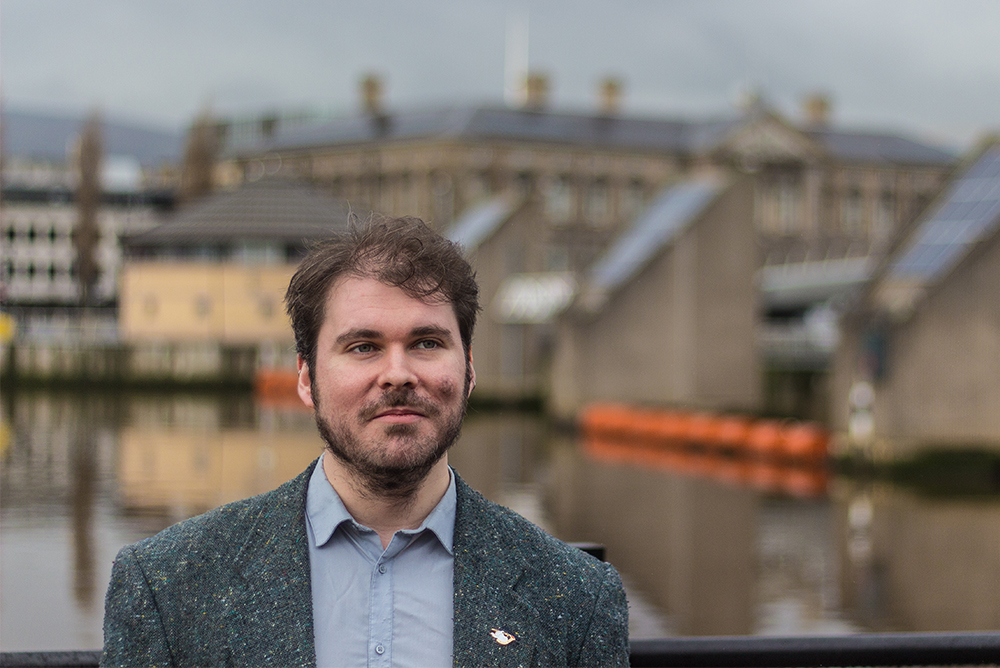
Courtesy of Stephen Sexton.
Stephen Sexton is the author of two poetry collections, If All the World and Love Were Young and Cheryl’s Destinies. He lives in Derry, Northern Ireland and teaches at the Seamus Heaney Centre at Queen’s University, Belfast. Our October poetry curator for the Poetry Curator Series, Sexton chatted with us in the green room about his favorite snooker player, finding inspiration in Tokyo’s iconic crosswalks, and how his musical curiosity led him to poetry.
Who are some poets that have most influenced you?
There’s all manner of people I think about: Ciaran Carson, Paul Muldoon, Sinead Morrissey, Leontia Flynn. Also, Seamus Heaney, who continues to be this remarkable example of how to be a poet in the world and an individual in a society—to have political responsibility as well as artistic and aesthetic responsibility.
How has the pandemic affected how you think about or write poetry?
What’s most interesting about the pandemic is how difficult it is to write about, and yet there is this desire to try. At the start of it, people came up with a lot of clumsy analogies. You had people saying, “It’s just like being in prison,” and it’s like, no, it’s not remotely the same; you’re at home. It struck me as interesting that a metaphor needs two people to work. We couldn’t come up with any metaphors, because we couldn’t talk to anybody else—this is what you think about when you’re up all night, starting work at 11:30 until three o’clock in the morning, sort of thinking: Why is our language failing here when we’re trying to come up with this?
Where is a place that you haven’t visited yet but want to go?
Those famous, massive pedestrian crossings in Tokyo. It holds some incredible fascination for me [ever since I first saw it depicted in video games as a kid] and is a place where my imagination comes from. That’s the only place that I truly passionately want to go. But it’s a very long way away.
How do you handle being in traffic?
There’s a lot of roadwork on my drive from home to work, and it feels like a kind of moral test in some ways. But if I can sit through it, it’ll get better. So, I listen to the radio. I listen to podcasts. I can deal with it.
Where did you write your recent book, Cheryl’s Destinies?
Most of it really took shape during the lockdown, in my home, here, in Northern Ireland. I would start work at 11:30 at night. All this thinking in the weird hours of the middle of the night—thinking about what was going on in the world, feeling not exactly loneliness, but just all this time of being awake at night and looking forward to going outside again… It was written when place was particularly profound as an idea. We were bound to it.
What music are you listening to right now?
I went through a big phase of listening to the country singer Jason Isbell. At this time of the year—something about the autumn—I tend to put on R.E.M. I listen to a lot of the Smashing Pumpkins. And, I’m very late to the party, but Taylor Swift is really good. I’ve got two albums that fundamentally changed my life: In the Aeroplane Over the Sea by Neutral Milk Hotel and Lubbock (On Everything) by Terry Allen. They changed the way I think about life and art, the way that good albums sometimes do.
Who was your childhood hero?
I really loved watching snooker, and my favorite player was a guy called Stephen Hendry. I think that was mostly, though, because my first name is Stephen and my middle name is Henry, which is extremely close to Stephen Hendry, so that might’ve created this automatic kind of connection.
If you were not a writer, what would you be doing instead?
When I was a teenager, one of the things I did a lot of was play music. I spent all of my student loans buying increasingly ridiculous instruments that I was curious about. So, I spend a lot of time listening to music and instruments and being curious about how sound works in different ways. At that time, I thought I wanted to play music, and I did teach music for a little while, which I enjoyed. But there came a point that I realized that of all the music I liked, what I actually liked about them was the lyrical quality, the language.



